_We may earn revenue from the products available on this page and participate in affiliate programs. Learn more ›
_
Best For Ice Fishing
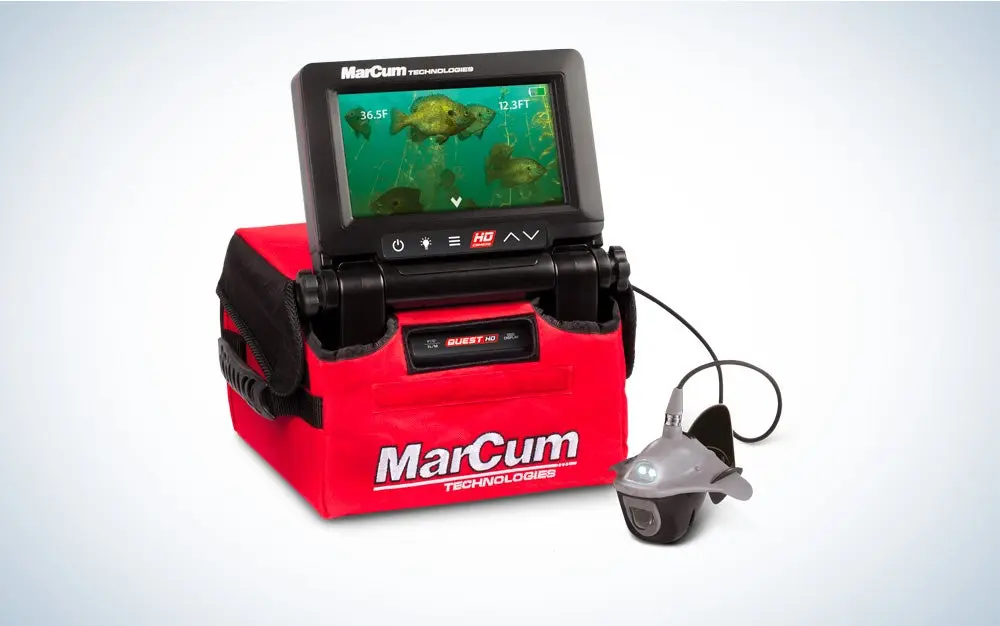
Marcum Quest HD L Lithium
LEARN MORE
Summary
Boasting one of the best runtimes in the business, the Marcum is built to handle the extreme cold temperatures present on many Midwestern lakes in January.
Pros
11 Hours of runtime
Depth and temperature readings displayed on screen
Excellent picture detail
Cons
Requires a separate device for recording
Best Low Light
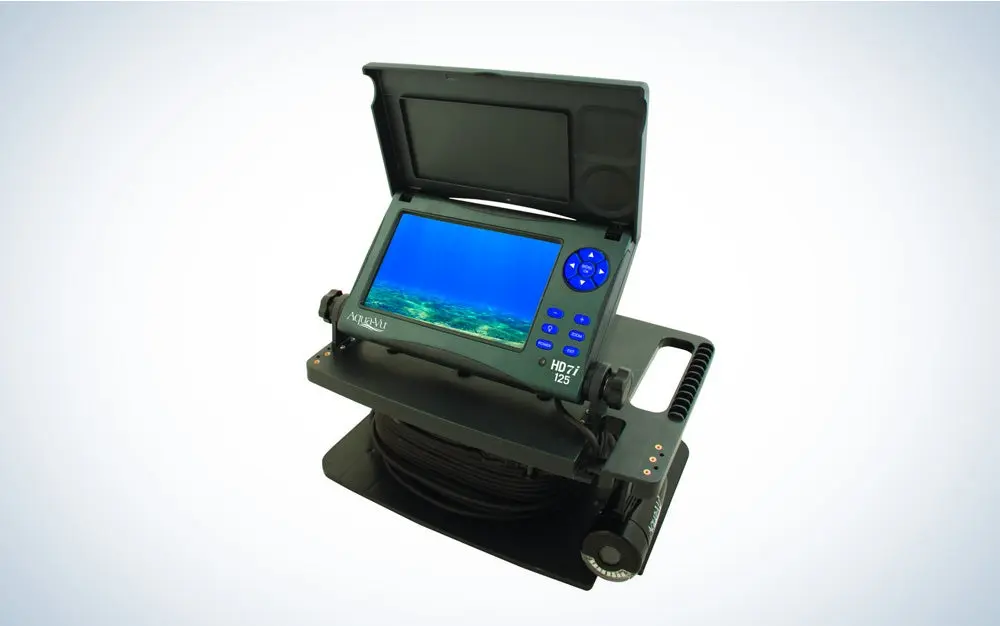
Aqua-Vu HD7i-125
LEARN MORE
Summary
The Aqua-Vu HD7i-125’s adjustable infra-red lighting and large display help anglers probe the darkest depths for big fish hidden far below.
Pros
Monitor can be viewed in daylight
IR lights are adjustable
Can be used on ice or boat
Cons
Price tag
Best for Trolling
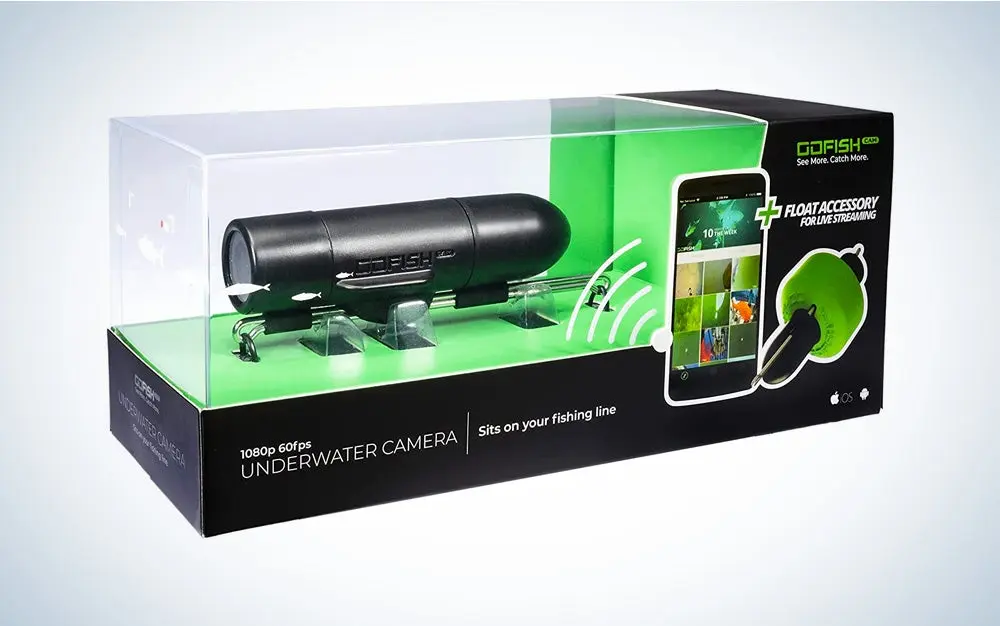
GoFish Cam
LEARN MORE
Summary
The GoFish is the sleek, and simple option for capturing heart-racing footage of fast-paced strikes while trolling.
Pros
Small profile
Can be casted and retrieved
Affordable
Cons
Limited battery life
Can only show a live view in “bobber mode”
The best underwater fishing cameras are valuable tools for any angler, but especially for ice fishermen. Used in conjunction with a fish finder
, there is no better way to get a glimpse into the hidden world beneath the surface of the water. This type of camera not only allows you to spot fish, but also helps you learn more about the lake bottom, any present structure, and the water clarity. Knowing these factors can help make you a better angler as you understand not only where the fish are, but why they are there in the first place.
While this type of technology was rather expensive when it was first introduced in the late 90s and early 2000s, it has gotten much more affordable since. Subsequently, just about any angler can find a camera to fit his or her budget. With that in mind, here are our picks for the best underwater fishing cameras currently on the market.
Best for Ice Fishing: Marcum Quest HD L Lithium
Best for Murky Water: Vexilar Fish Scout Infra-Red/Color
Best Low Light: Aqua-Vu HD7i-125
Best Budget: Eyoyo Fishing Camera with 7-inch Monitor
Best Portable: Aqua-Vu Micro Stealth 4.3
Best for Trolling: GoFish Cam
How We Picked the Best Underwater Fishing Cameras
Most modern underwater fishing cameras are built with ice fishing in mind, but we considered many other factors than just performance on hard water. In many ways, picking one of these cameras is a lot like buying any regular digital camera. Generally, the more expensive the camera, the better quality of the video and still images it can capture. However, there are other things to consider when shopping:
Monitor: Does this camera have its own monitor or does it hook up to a cellphone? How large is the display? Can it be seen easily while the sun is shining?
Resolution: Is the camera standard definition, or can it film details in HD?
Battery Life: Can you fish all day with this camera? Do you need to bring an extra battery?
Lighting: Does the camera have a lighting system for viewing underwater at night or at depth?
Cable Length: How deep can the camera go?
Best Underwater Fishing Cameras: Reviews and Recommendations
Best for Ice Fishing: Marcum Quest HD L Lithium
Best for Ice Fishing

Specs
Resolution: 800 x 480
Dimensions: 10” x 10” x 7.5”
Weight: 10.2 Pounds
Cable: 75 Feet
Battery: Lithium ion phosphate 12.8 Volts
Pros
11 Hours of runtime
Depth and temperature readings displayed on screen
Excellent picture detail
Cons
Requires a separate device for recording
The Marcum Quest HD has become a favorite of ice anglers because of its long runtime and the battery’s ability to operate in low temperatures. This underwater ice fishing camera is one of the best on the market with a 1920 x 1080p sensor. It feeds bright vibrant images back to the 7-inch flat panel display. When the weather is nice and sunny, Marcum included a sun and snow shield for watching the display. Additionally, anglers can switch to black and white, and they can adjust the brightness and contrast for the conditions.
The biggest downside to the Marcum is the fact that it does not record the footage it is sending unless you get a separate adapter or digital video recorder. While Marcum does make that easy to do thanks to an HDMI cable, it is also something that isn’t clearly specified by the company until you read the fine print
. Consequently, for $650, it’s a little disappointing to tote an extra device and cord out on the ice when this functionality could have easily been built into the unit in the first place.
Best for Murky Water: Vexilar Fish Scout Infra-Red/Color
Best for Murky Water
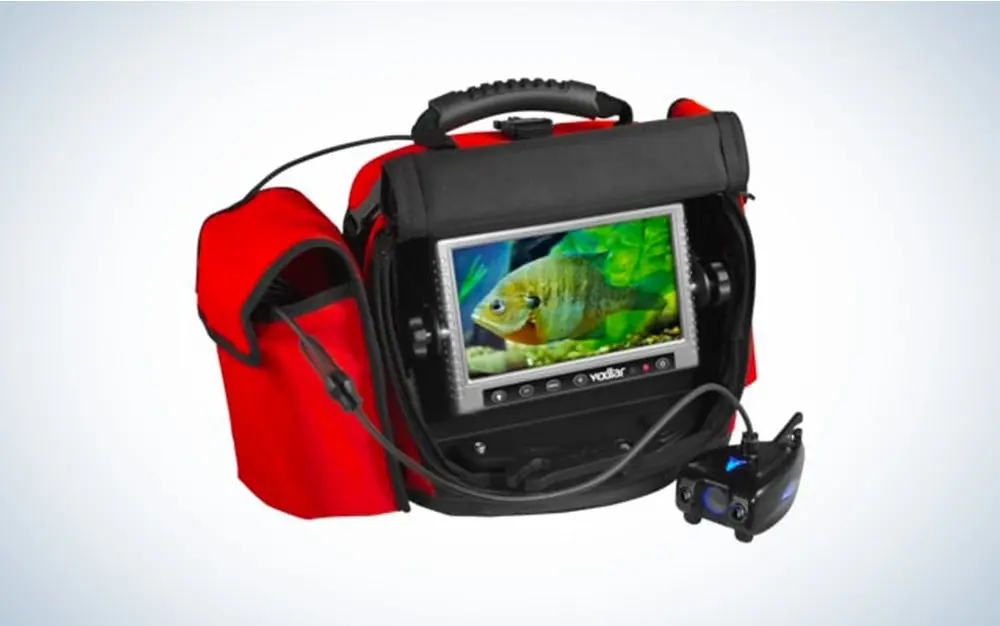
Specs
Screen Size: 7”
Dimensions: 5.5” x 0.75” x 5.5”
Weight: 9.5 Pounds
Cable: 90 feet
Battery: 12-volt, 9 Ah
Pros
9-hour battery life
Camera displays in color or black and white
Carrying case included
Cons
Auto light sensitivity may need adjusting
Murky water presents a special challenge for underwater cameras, but the Vexilar does both color and black and white with an auto gain feature to help ensure the picture quality stays consistent. Additionally, infrared LEDs help cut through the gloom when the water just isn’t clear. Another great feature of this camera is the nine hours of battery life, which is significantly more than most other models on the market right now.
While this camera features great image quality, the one quirk reported by users
is that the auto gain system sometimes needs tweaking. Specifically, it only seems to be an issue when light levels change drastically. However, for the price, and the additional features like an attached case, this is a great camera for a variety of fishing scenarios. It’s worth noting that Vexilar makes a great ice fishing fish finder
, too, if that’s what you’re looking for.
Best Low Light: Aqua-Vu HD7i-125
Best Low Light

Specs
Resolution: 1080p HD
Screen Size: 7″
Weight: N/A
Cable: 125 Feet
Battery: 12-volt, 9 Ah
Pros
Monitor can be viewed in daylight
IR lights are adjustable
Can be used on ice or a boat
Cons
Price tag
As many anglers know, the bite is often better at night or at dawn or dusk. When the light is low, that’s when many cameras struggle to perform. We picked the Aqua-Vu for these scenarios because the company made the infrared lighting on this camera adjustable for the user. Basically, anglers can perfectly tweak the IR lights to perfectly fit the scenario no matter how much or how little light is present. Although this is also a good camera for poor weather conditions due to the IP67 waterproof components, and a heated LCD that keeps the screen from freezing up.
The $1,000 price tag is undeniably the biggest downside to the Aqua-Vu. However, there is some added value from the fact this camera is built to mount easily to a boat in warmer months. Aqua-Vu also built the screen to be visible in direct sunlight, so you can easily use the camera on the brightest of summer days.
Best Budget: Eyoyo Fishing Camera with 7-inch Monitor
Best Budget
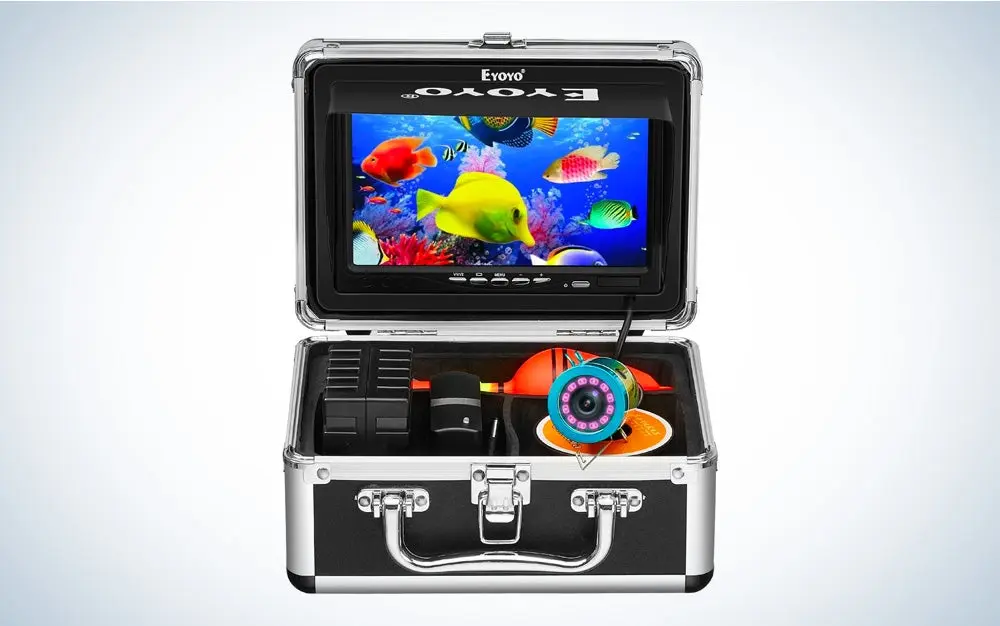
Specs
Resolution: 800 x 480
Dimensions: (Case) 6.5” x 4.6” x 8.3”
Weight: 3.7 Pounds
Cable: 49 feet
Battery: 4500 mAh
Pros
Affordable
Built-in carrying case
Sun visor included
IR light for low light fishing
Cons
Does not record video
Case is unbalanced
At $139, the Eyoyo has many features that are found exclusively on more expensive underwater fishing cameras. Accordingly, this camera has a sharp 720p picture. This is thanks to the seven-inch LCD monitor that has been built into the case. There is also a sun screen for sunnier days. It helps cut down on the glare significantly, especially while ice fishing. Eyoyo gives this camera a 49-foot cable that will work exceedingly well for most smaller lakes and streams. Lastly, this camera has infrared lights for fishing in low light or at night.
While this camera comes at an excellent price point, the biggest flaw is the fact that the cheapest model cannot record video. If you need to record video, Eyoyo offers two other models, a 98-foot cable
, and a 164-foot cable
, that both offer that capability. Another flaw in the design is the weight of the monitor, as noted by D. Dion in an Amazon review
: “The LCD screen is relatively heavy compared with the rest of the case, and it’s easy for the case to fall over.” Adding a little weight to the bottom of the case may solve the issue.
Best Portable: Aqua-Vu Micro Stealth 4.3
Best Portable

Specs
Resolution: N/A
Dimensions: 5” x 3.25” x 2”
Screen Size: 4.3″
Cable: 50 Feet
Battery: Lithium-ion
Pros
Compact and lightweight
Under $200 price tag
Long battery life
Cons
Not great in low light
Hard to view screen in daylight
The Micro Stealth’s compact 4.3-inch screen solves many of the size and weight problems that are common with larger camera systems. Likewise, this makes this camera perfect for smaller crafts such as a kayak or canoe. This camera will also easily stow into a spare pocket in a tackle bag for shore anglers on the move. We also like this camera for anyone on a budget since it comes in under the $200 from some retailers.
Most user reviews also praise this camera for the long battery life. However, the big downside often reported
for this camera is that it is not the best for low light conditions, mostly because the IR lights are non-adjustable. Another reported issue
is the screen is difficult to view in direct sunlight.
Best for Trolling: Go Fish Cam
Best for Trolling

Specs
Resolution: 1080p or 720p and 60 frames per second
Dimensions: 4.5 inches long
Weight: 3.3 ounces
Cable: None
Battery: Lithium-ion
Pros
Small profile
Can be casted and retrieved
Affordable
Cons
Limited battery life
Can only show a live view in “bobber mode”
When trolling, a good underwater fishing camera (along with a good trolling motor
) can be helpful. However, using a camera while trolling presents a special challenge. However, the GoFish is a good option because of the torpedo-like profile that helps it glide effortlessly through the water in front of your lure. The GoFish cam can also film in either 1080p or 720p HD, and up to 60 frames per second. This cam is a great option for fishing YouTubers who wish to capture footage of aggressive strikes. Additionally, this camera can be casted or fished below ice for versatility.
The big downside for this camera is that it is mostly meant for content creation since it doesn’t provide a live view unless you attach the optional float and use it as a bobber. This is because the camera operates on WiFi signals, and they cannot reach underwater. Another downside to this camera is the battery life, which many online reviews put at around 90 minutes. While this camera can’t film all day, it will capture some spectacular images anglers can learn a lot from.
What to Consider When Choosing an Underwater Fishing Camera
It’s easy to find a cheap underwater fishing camera out there, but in our experience, it is usually worth spending a little extra for a good one. The biggest thing most anglers overlook when buying one of these cameras is the battery system. Lithium-ion batteries are lighter, and they usually run much longer than lead acid, especially in colder conditions. Obviously, that’s an important factor when planning a full day on the ice in late winter.
When it comes to batteries, it’s also worth considering a secondary battery to run just the monitor. Many manufacturers now make it possible to run the camera and monitor on separate power systems. While this is an added expense, it also means you’ll be able to use the camera and monitor longer than you would running both on the same battery.
Lastly, most underwater fishing cameras do not have recording capabilities built into the system. Surprisingly, many of these systems still require adapters, DVR recorders, and other attachments to capture and save video. If your primary use for the camera is content creation, it’s worth figuring out how difficult it will be to record with your chosen system.
FAQs
Is an underwater camera better than sonar for ice fishing?
Both are incredibly useful tools for fishing, and many ice anglers like to utilize both. Sonar has a slight advantage in that it’s usable in all water clarity and light conditions. The field of view is also not limited by a camera lens. However, cameras do offer more excitement in being able to see the actual fish strike your lure and not just a mark on a graph or flasher.
Do underwater cameras scare fish?
This depends greatly on the body of water, and the species of fish. Obviously, almost any fish is going to be instantly frightened of a camera that gets dropped right on top of them. However, in most instances, especially with panfish, bass, and pike, the fish will return. Generally, fish tend to ignore cameras unless it’s a high-pressure lake where every angler is using them.
What are the disadvantages of underwater cameras?
Cameras are often at the mercy of the water clarity and their field of view. Unless you’re using a 360 degree underwater fishing camera, you’ll need to rotate the camera to find the fish or your bait. Most cameras also do not have an indicator the direction they are pointing, which makes it challenging to find a specific piece of structure on the lake bottom.
Are underwater cameras worth it?
Underwater cameras are worth the high cost of admission because in addition to helping anglers find fish, they can also educate. Even experienced fishermen and women can learn a lot from watching fish react to their lures, or noting how they relate to cover. With a camera that also displays information on water temperature and depth, anglers can learn the optimal feeding patterns to target year after year.
Final Thoughts on the Best Underwater Fishing Cameras
Best for Ice Fishing: Marcum Quest HD L Lithium
Best for Murky Water: Vexilar Fish Scout Infra-Red/Color
Best Low Light: Aqua-Vu HD7i-125
Best Budget: Eyoyo Fishing Camera with 7-inch Monitor
Best Portable: Aqua-Vu Micro Stealth 4.3
Best for Trolling: GoFish Cam
The Marcum Quest HD and the Aqua-Vu HD7i-125 are our two top picks for best underwater fishing cameras. Mostly because these two cameras offer the best picture quality out of the cameras on this list. Although we also picked them because these two cameras offer the most versatility for a variety of fishing styles and water conditions. Although it’s hard to go wrong with any of these cameras if you’re looking to get a better peek into the fish’s underwater world.
Why Trust Us
For more than 125 years, Field & Stream has been providing readers with honest and authentic coverage of outdoor gear. Our writers and editors eat, sleep, and breathe the outdoors, and that passion comes through in our product reviews. You can count on F&S to keep you up to date on the best new gear. And when we write about a product—whether it’s a bass lure or a backpack—we cover the good and the bad, so you know exactly what to expect before you decide to make a purchase.
![Field & Stream [dev]](https://images.ctfassets.net/fbkgl98xrr9f/1GnddAVcyeew2hQvUmrFpw/e4ca91baa53a1ecd66f76b1ef472932b/mob-logo.svg)




